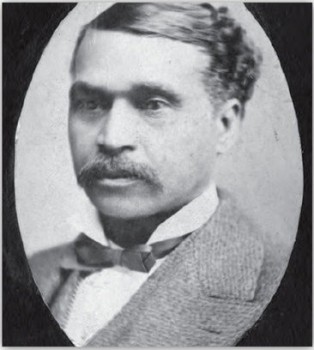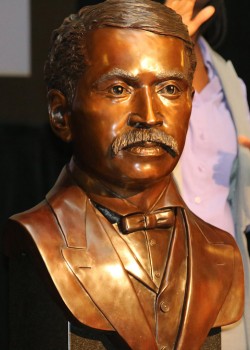Indiana at 200 — Indiana’s First Black Lawmaker
By ANDREA NEAL
 James Sidney Hinton, a Union Army veteran and Republican Party orator, was a 19th century torchbearer for civil rights who became the first African-American elected to the Indiana General Assembly.
James Sidney Hinton, a Union Army veteran and Republican Party orator, was a 19th century torchbearer for civil rights who became the first African-American elected to the Indiana General Assembly.
Hinton achieved this distinction during an era of sweeping social and political change — and at a time when blacks in the Hoosier state faced much of the same racial prejudice as those living in the South.
Indiana’s 1816 Constitution prohibited slavery and indentured servitude, making it a “free” state, yet few white Hoosiers were willing to accept racial equality. The revised state Constitution of 1851 prohibited Black migration into Indiana; other laws kept Blacks from voting, sending their children to public schools or testifying in a trial involving white citizens.
“Indiana was often described as being one of the more southern of the northern states because of its laws that openly oppressed and discriminated against African Americans,” said historian Wilma Moore. “James Hinton played an important and significant role in Indiana political history.”
![]() Hinton was born on Christmas Day in 1834 to free Black parents in Raleigh, N.C. His father, John Cook Hinton, was a successful businessman. His mother, Hannah (Mitchell) Hinton, was a piano teacher and active with the Methodist Episcopal Church. The family moved to Terre Haute around 1848 when James Hinton was still a teen. He attended schools organized and taught by African-Americans.
Hinton was born on Christmas Day in 1834 to free Black parents in Raleigh, N.C. His father, John Cook Hinton, was a successful businessman. His mother, Hannah (Mitchell) Hinton, was a piano teacher and active with the Methodist Episcopal Church. The family moved to Terre Haute around 1848 when James Hinton was still a teen. He attended schools organized and taught by African-Americans.
Hinton worked as a teacher and a barber, then moved to Indianapolis around 1860 and opened a “real estate and intelligence office,” according to historical records.
Because Blacks were prohibited from joining the military in Indiana, Hinton volunteered for military service in Massachusetts after the Civil War erupted. He served as a recruiter for the Massachusetts 54th and 55th U.S. Colored Regiments and returned to Indiana in 1863 to assist with the organization of the Indiana 28th U.S. Colored Troop, Moore said.
Following the war, Hinton, a staunch Republican, stumped on behalf of the “party of Lincoln” to Black voters in Alabama, Georgia, Indiana, Mississippi and Tennessee. It was during these travels that Hinton advocated for educational opportunities for Black children, and for public funds to be allocated for schools and teachers.
He served as a presidential elector-at-large and was one of two Black delegates to the National Republican Convention in 1872. In 1874, he became the first African-American to hold statewide office when he was appointed Trustee of the Wabash and Erie Canal.
His greatest political achievement was his election to the Indiana General Assembly in 1880, making him the first African-American to represent Indianapolis in the House of Representatives.
“Thirty years ago, the Indiana Legislature was engaged in concocting brutal laws to prevent the entrance of colored people into this state,” proclaimed the Indianapolis Leader, a Black newspaper, after his election. “Now a member of the race then proscribed is a member of the Legislature. Time sets all things right.”
 Hinton served one term. He was the first of four Blacks to serve in the Legislature in 19th-century Indiana. The others were James M. Townsend of Richmond, elected in 1884; Richard Bassett of Howard County, elected in 1892; and Gabriel Jones of Indianapolis, elected in 1896.
Hinton served one term. He was the first of four Blacks to serve in the Legislature in 19th-century Indiana. The others were James M. Townsend of Richmond, elected in 1884; Richard Bassett of Howard County, elected in 1892; and Gabriel Jones of Indianapolis, elected in 1896.
Directions: The Hinton memorial is on the second floor of the Statehouse, 200 W. Washington Street, Indianapolis.
EDITORS NOTE: This is a series of essays leading up to the celebration of the Indiana Bicentennial In December 2016. The essays focus on the top 100 events, ideas and historical figures of Indiana, in chronological order, tying each to a place or current event in Indiana that continues to tell the story of the state.
Andrea Neal is a teacher at St. Richard’s Episcopal School in Indianapolis and adjunct scholar with the Indiana Policy Review Foundation. She has written extensively about taxes, good governance, higher education, civic education and K-12 reform. Contact her at [email protected].
Indiana Policy Review Foundation is a non-profit education foundation focused on state and municipal issues.

